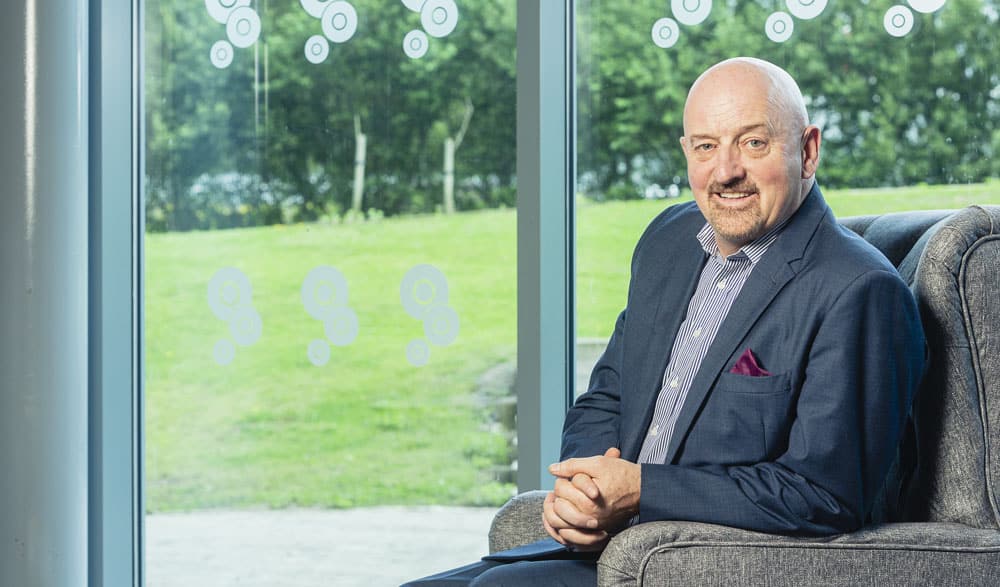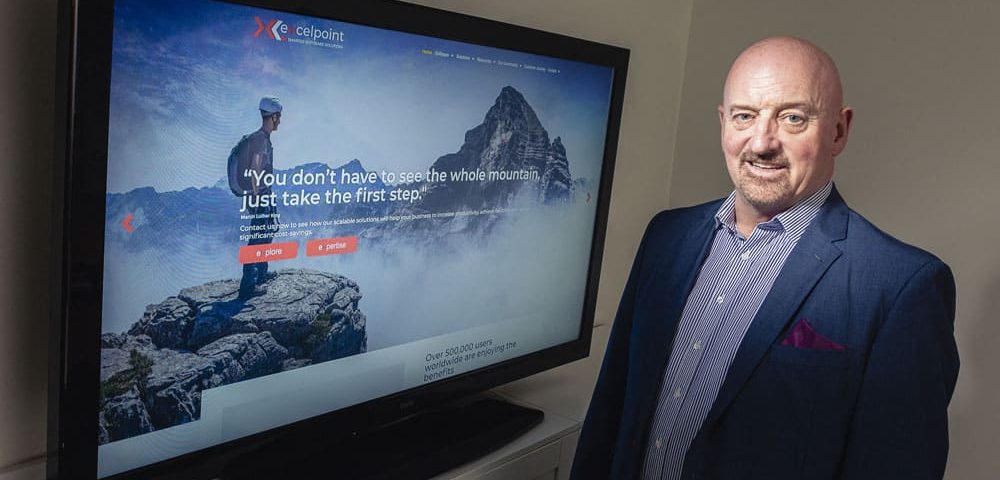Ian Brown, managing director of Excelpoint, talks to Peter Barron about plotting his route to business success – and his ambitions for the software solutions company to go even higher…
As a teenage boy growing up in County Durham, Ian Brown developed a passion for the great outdoors and climbing Britain’s highest peaks.
“I loved nothing more than camping, plotting adventures, and working out the best routes to get to the top of mountains,” he recalls.
Now, as a successful entrepreneur, Ian sees climbing mountains as the perfect metaphor for running his software innovations business, Excelpoint, based on Aycliffe Business Park.
A mountainscape even forms the backdrop on the home page of the company website, with a quote from Martin Luther King: “You don’t have to see the whole mountain, just take the first step.”
As MD, Ian sees it as his job to help Excelpoint’s customers to meet their challenges. “We come up with solutions to help them to get where they want to go – and that’s what I’ve always enjoyed doing,” says Ian.
At the start of what has turned out to be an unforgettable year, the fast-growing software solution provider moved its head office to a new custom-designed office within The Work Place, only for the Covid-19 crisis to force the 20-strong team to work from home.
But Ian takes justifiable pride in having seen his workforce rise to the challenge, and go on doing what they do best – enabling large and small customers to adapt to the global pandemic.
“We are a software company, but it is our people who make the difference,” he says. “We have built a first-class team, and they use the technology to find the solutions our customers need. Our raw material is brain power.”
And yet, Ian is the first to admit that he wasn’t a high-flyer at school. “I did reasonably well, and didn’t have to work hard, but I was more attracted to being outdoors and exploring,” he recalls.

Ian was born and raised in Bishop Auckland. His father was a HGV driver with the unlikely name of Cresswell – “I think he was named after a footballer” – and his mother, Mona, worked in shops in the town centre before becoming the cook at Cockton Hill Primary School. That’s where Ian began his education, before moving up to King James Comprehensive around the same time as he joined the Boy Scouts and pursued his love of the countryside.
He stayed at King James for his O and A-levels, in an era when computer studies had become a fancy new option. “I did it for a year but dropped it because I didn’t think it would ever catch on!” he says, smiling at the irony.
His interest in computer systems was reignited, however, when he joined ITEC on a Youth Training Scheme, which included a placement in the computer department at GEC Telecommunications. He impressed enough after a couple of months to be offered a permanent job as a programmer, and that vital first step had been taken on the climb to the top.
When he started as a young whizz-kid in 1981, the GEC site had a data entry room, employing ten typists, and running just three processing terminals. By the time he left, eight years later, his innovative contribution to the department led to the number of terminals growing to 120, and to the business operating a myriad of systems.
The systems created by Ian and his colleagues enabled GEC’s Aycliffe site to become independent of its mainframe – hundreds of miles away in Coventry – and far more efficient. His success led to him being poached by Microdata, which was to evolve into Northgate Information Solutions, providing software for public sector bodies, including councils and police forces across the UK.
While at Northgate, Ian worked alongside a “rising star” in sales, Derek Buchanan, who left to head up a company called Sunrise Software, and Ian was head-hunted again – this time to join the board.
It meant him moving out of a tech role into sales – “selling answers to problems” – for two-and-a-half years. Meanwhile, two friends had set up Excelpoint, in Bradford, carrying out bespoke development work, and, in 2003, Ian was invited to become part of a business restructure as major shareholder and managing director.
For a while, Excelpoint dispensed with its office, preferring staff to work from home, but Ian soon felt the company missed out on important “softer interactions” between the employees. Consequently, office space was rented at Shildon, and, as Excelpoint grew, the company moved to Flexspace, on Aycliffe Business Park, before relocating to The Work Place at the start of the year.
With the dark clouds of Covid gathering, Excelpoint was ahead of the game by arranging for its staff to work from home, fully two weeks before the official lockdown. But despite the company continuing to help other businesses overcome the challenges of home-working, Ian has no doubt that he wants his own team to return to an office-based environment as soon as possible.

“There are fewer distractions when you’re working from home, and in many ways, more gets done. But what you lose is that cross fertilisation that is so vital to problem-solving,” he says.
“We have a really productive team culture, with a team who have a great attitude.”
It is a culture that has been the foundation of a highly progressive business, with a customer base that includes the likes of National Air Traffic Services; global mining group Minova; CI Biomass; Hanson – part of the Heidleberg Cement Group; and NHS trusts in Scotland and Northern Ireland.
Excelpoint is also working with HM Revenue and Customs to enable staff to work more flexibly during the pandemic.
Ian and his wife, Debbie, live in Woodham Village and their three sons – Curtis, Lloyd, and Costner – all now play a part in Excelpoint as the company continues to aim high.
Indeed, two new strategic partnerships have just been signed: one with Altia-ABM – specialising in criminal investigation software – and a re-selling agreement with CI Biomass.
And, in defiance of the challenges brought by the biggest public health crisis in a generation, Ian remains confident of continued growth.
“Over the last 20 years we’ve developed expertise as a nocode platform and no-code platforms are now a buzz, and that market will grow very significantly, so I guess we have a 20-year head start,” he predicts. “An international expansion we were planning for this year hasn’t happened because of Covid – but it will. It’s just a matter of time.”
The company boss who grew up with a love of climbing mountains clearly hasn’t peaked just yet.








